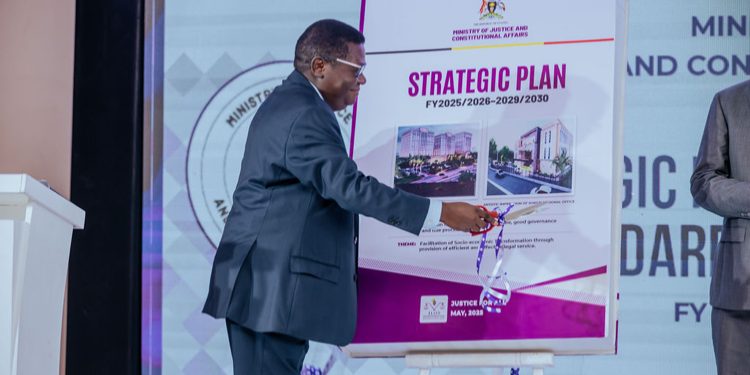The Ministry of Justice and Constitutional Affairs has launched its Sixth Strategic Plan, Service Delivery Standards, and Client Charter, outlining a renewed commitment to efficient, accountable, and citizen-centered justice services over the next five years.
The documents, launched during a breakfast meeting at Mestil Hotel, set the Ministry’s development direction for the FY2025/26–2029/30 period and form part of government efforts to strengthen governance, constitutionalism, and access to justice.
Presiding over the event, Minister of Justice and Constitutional Affairs Norbert Mao said the plan marks “a new course for transformation” in Uganda’s legal and governance systems, emphasising efficiency, innovation, and accountability.
“This occasion symbolises our collective resolve to deepen justice, constitutionalism, and good governance in Uganda,” Mao said.
“By the end of this plan period, the Ministry envisions improved legal service provision, increased automation, and stronger human resource capacity.”
The Permanent Secretary, Robert Kasande highlighted major achievements recorded under the Fifth Strategic Plan, including progress on the long-awaited JLOS House, which is nearing completion and expected to save the government over UGX 30 billion annually in rent.
Other milestones include, saving UGX 4.6 trillion in litigation costs through effective legal representation, Construction of regional offices, including Soroti, now at 78% completion, Issuance of 15,911 certificates of no objection to ease estate administration.
Payment of UGX 158.3 billion in compensation to 28,281 verified war debt claimants across Acholi, Lango, and Teso, Digital transformation initiatives supported by UNDP, including an Electronic Document Management System, teleconferencing equipment, and upgraded ICT tools.
He emphasised that these successes reflect the Ministry’s steady progress in strengthening access to justice, enhancing legal advisory services, and improving the management of estates and public legal affairs.
The Sixth Strategic Plan, developed in line with the National Development Plan IV, Vision 2040, and regional frameworks, focuses on five key objectives, including strengthening regulatory compliance, enhancing justice service delivery efficiency, protecting the Bill of Rights, promoting Uganda’s regional and international legal interests, and boosting institutional capacity.
Kasande noted that the Ministry’s strategic efforts are aligned with government transformation goals and will help bring services closer to the public.
The Service Delivery Standards outline clear performance benchmarks, including timelines for legal opinions, legislative drafting, civil litigation, estate administration, and budgeting processes.
The standards provide binding obligations to ensure transparency, predictability, and improved responsiveness.
The Client Charter sets out citizen rights, responsibilities, and mechanisms for feedback and redress, reinforcing the Ministry’s pledge to “serve with integrity, professionalism, impartiality, and transparency.”
Mao called for stronger financial and technical support, especially from the Ministry of Finance and justice sector development partners, to ensure the effective implementation of the plan.
“Let this Strategic Plan, Service Delivery Standards, and the Client Charter be our collective compass in steering Uganda toward a future anchored in justice, dignity, and constitutionalism,” Mao said.









